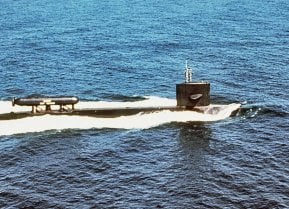NATO Has 2 Big Problems: The Russian Military Threat and a Donald Trump Comeback
Do not be deceived by Russia’s oft-bumbling, incompetent, and even self-destructive military strategy and battlefield tactics, a long-established Russian military tradition this time playing out in Ukraine.
The Paradox of American Leadership and the Future of Europe: European leaders understand that Russia's threat is real. They also understand that what that threat amounts to depends on the United States. You can hear it in their voices, as what that future shall hold is about to become clear. The concern and even fear that the German president expressed during President Biden’s recent visit were dramatic and unprecedented.
Do not be deceived by Russia’s oft-bumbling, incompetent, and even self-destructive military strategy and battlefield tactics, a long-established Russian military tradition this time playing out in Ukraine. The nature of the Russian threat going forward will become crystal clear in just a few weeks, and the two possible futures could not be more different.
One constitutes an existential threat to the democracies and European and global security, and the ascendance of right-wing, authoritarian governments. The other sees a needle popping the balloon of right-wing extremism, and the Russian threat fading. As of this writing, it is even odds which of these alternate futures will prevail.
Near the top of Russian dictator Vladimir V. Putin’s strategy for strengthening Russia, unchanged since he rose to power in 2000, has been to destabilize the democracies and reestablish Russian influence across the North Atlantic. This remains his priority and he has achieved remarkable success in pursuing it.
A quarter-century of Kremlin-sponsored Russian propaganda, disinformation, and election interference has fueled the rise of far-right, extremist parties and groups and undermined the very stability of the democracies. Among Putin’s successes in this regard were the growth of the Alternative for Germany (AfD) party in Germany, the rising influence of Marine La Pen’s National Rally in France, the success of Brexit and the rise of isolationism in the UK, and the triumph of a successor to Mussolini’s fascist party in Italy.
The pièce de résistance and the accelerant fueling all of these outcomes was Donald Trump’s election in 2016, which reflected Russia’s success in weakening the democracies internally and fracturing the alliances among them internationally.
This recent history, and the even greater future threat, lay behind German president Frank-Walter Steinmeier’s recent warning to the American people, to “remember your allies are indispensable for you.” As president, Trump both rhetorically and substantively undermined the NATO alliance and America’s century-long tradition of supporting European democracies.
He openly questioned the purpose of the post-war alliance that has defined North America and Europe for more than seventy-five years, while admiring and embracing dictators worldwide.
Putin assumed the damage done to the traditional unity of the West was lasting and would prevent the possibility of sustained or coordinated action against him. And so he invaded Ukraine on the expectation that Russia would conquer it with minimal resistance. He did not count on President Biden’s heroic and successful undoing of Trump’s damage, the full-throated European trust and acceptance of American leadership, and the emergence of a stronger and more united NATO. But the question is, is this merely a fleeting last gasp?
Trump’s continued political viability amounts to the greatest threat NATO has ever faced. He now promises to further isolate the United States and to undermine NATO if he reclaims the White House. That this is a real possibility is a testament to the depth breadth, and the success, of Russia’s attacks on the democracies.
The paradox of American leadership is stark. The far-right threat remains linked to politics in the United States, and American leadership is what may now lead to destruction and unspeakable danger. For lingering beneath the German president’s warning is a hidden promise. A Trump victory and concomitant American withdrawal will forever change relations across the North Atlantic and present the states of Europe with a choice between two evils, for themselves and the world.
Either path means a rearmed and militarily assertive Europe. One possible direction would see the EU deciding to rely on itself, to prepare to defend itself against the exploding Russian threat, and to respond to America’s abdication by replacing NATO with an EU military force led by a rapidly rearming Germany. While the dangers inherent should be obvious, they pale in comparison to the more likely and chilling “back to the future” alternative. In this scenario, Europe follows the U.S. lead, abandons integration, and cedes democracy to right-wing authoritarian governments independently arming themselves as NATO and the EU fade or dissolve altogether.
Either one of these futures promises widespread conflict if not catastrophe, and is why Presidents Steinmeier and Biden both referred to this as an “existential moment.” As Americans cast their votes, it is not just existential for the future of the United States, it is, as President Biden is so fond of repeating, an, “inflection point” not just for the future of the United States, but for the future of NATO and with it of European security and global stability.
Will the United States pop the balloon on the right-wing authoritarian threat that Russia leads? That is the choice, and the outcome rests on a knife’s edge as Europe and the world hold its collective breath.
About the Author:
Joel Ostrow is Professor of Political Science at Benedictine University, the author of The Consolidation of Dictatorship in Russia: An Inside View of the Demise of Democracy, a frequent media analyst on Russian politics and international security, and co-host of The World Discord Podcast. The views expressed here are strictly his own.
Image Credit: Creative Commons and/or Shutterstock.


